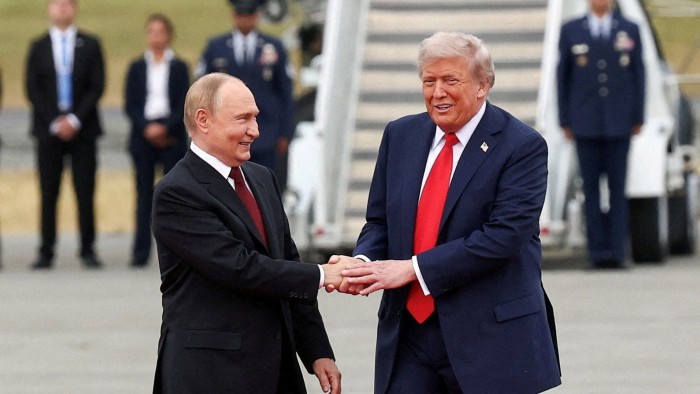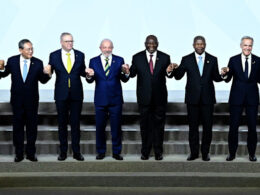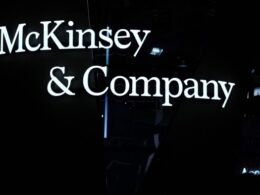This article is an onsite version of our Europe Express newsletter. Sign up here to get the newsletter sent straight to your inbox every weekday and fortnightly on Saturday morning. Explore all of our newsletters here
Welcome back. Kyiv is never as safe as when Keith Kellogg is in town. President Volodymyr Zelenskyy joked that Kellogg, the US special envoy to Ukraine, was the country’s most effective means of air defence, since Russia would not strike the capital during his visits. Come more often, Zelenskyy told the former general at the Yalta European Strategy (YES) conference in Kyiv last week.
It was a good natured remark. But you can also give it a different meaning: Kellogg has his uses, but persuading President Donald Trump to turn up the pressure on Moscow — with tougher sanctions and fresh military aid to Ukraine — is not one of them. I’m at ben.hall@ft.com.
No pressure
Trump is back to blaming Ukraine for the war. He is doing everything to avoid putting new sanctions on Russia, demanding first that the EU in effect puts a trade embargo on India and China, which is not going to happen, or immediately bans imports of Russia crude oil, a step his allies Hungary and Slovakia are thwarting. Meanwhile, the president’s ambiguous response to Moscow’s drone incursion into Poland has raised further questions about America’s commitment to European security.
Trump sent a video message to the YES conference, an annual gathering of Ukrainian and European leaders in Kyiv, repeating his lines about ending a “senseless” war. Despite his address, US policy was a strikingly peripheral topic in discussions and there were few American officials present.
His peace process is going nowhere since Russian President Vladimir Putin has no intention of engaging. So the war grinds on and it is over to Europe to do the heavy lifting in terms of supporting Ukraine.
Fire fight
But there is also deep frustration in Ukraine about Europe’s inability to translate its solidarity into defence industrial capacity on a scale that Kyiv needs to defend itself or to quickly wean itself completely off Russian oil and gas imports.
Ukraine has rebuilt its defence industry and pioneered new technologies, particularly drones. It claims to have the indigenous capabilities to strike deep into Russian territory, but lacks the resources to expand manufacturing. Barely a day goes by without Zelenskyy or his ministers pointing out that their country can only finance about one-third of its potential weapons production. The president’s pitch now is: give us the money and let us get on with it. Ukraine would apply “sanctions” pressure of its own, he said.
“The most effective sanctions — the ones that work the fastest — are the fires at Russia’s oil refineries, its terminals, oil depots,” Zelenskyy said, referring to a campaign of drone and missile strikes that Ukraine began this summer.
Just about manageable
One western diplomat admitted that the European patience with Trump as he dodges the question of putting pressure on Moscow would at some point become “untenable”. But in the meantime, Ukraine continues to receive US intelligence and reconnaissance assistance and deliveries of American weapons and ammunition paid for by the European members of Nato.
Lawrence Freedman makes a similar point in a Substack newsletter. Europeans have “little choice but to persevere” with Trump, he writes. “Exhausting and frustrating”, though it may be, “it also helps forge some solidarity among the leaders involved. They are acting more independently of the US while avoiding a complete break.” He adds:
Trump blows hot and cold on the alliance but for now he sticks with it. At some point, if Russia really did decide to test the coherence of the alliance, the consequences could be truly dire but for now they are just about manageable.
Ukraine’s hopes of getting the resources it needs to fight back have risen with the news that the EU is drawing up options for a “reparation loan” backed by Russian frozen assets, €194bn of which are held at Euroclear, the Belgium-based central security depository. In her State of the Union speech last week, European Commission president Ursula von der Leyen endorsed the idea, which is intended to circumvent legal objections to outright seizure of the assets. Berlin seems ready to consider a more ambitious approach to the issue but other capitals still have misgivings and the technicalities are complex.
European fantasies
Whether or not Europe is able to provide a big load of cash, it needs to be much more robust in its support of Ukraine, says Ian Bond in this trenchantly argued piece for the Centre for European Reform.
Bond says European leaders need to face up to the facts: Trump shows deference to Putin and will not pressure him to end the war; Putin is determined to fight on and will never accept an effective security guarantee for Ukraine; and the US is reluctant to help the Europeans provide one.
The real fantasy is to believe that Trump’s erratic peace overtures to Russia can end the war on minimally acceptable terms, or that Putin will stop fighting unless forced to do so.
European governments should deploy their air forces from neighbouring countries to protect the skies over western Ukraine and put boots on the ground even before a ceasefire. This seems highly unlikely to happen any time soon, but it is hard to argue with Bond’s conclusion:
European governments must stop hoping that the war will be resolved with minimal effort from them — either because the US will deliver a peace deal, or because Ukraine will make big enough concessions to buy Putin off, or because Putin himself will conclude that the costs of the war are too high.
Western allies have a huge amount to learn from Ukraine’s formidable defence innovation model, says Gillian Tett.
Ben’s pick of the week
Mercedes Ruehl dives into how Switzerland’s conservative central bank became one of the largest investors in US tech
Source link









